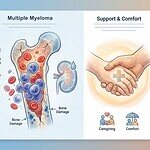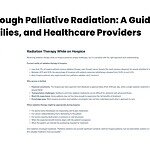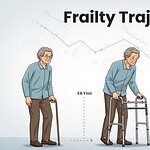Tag: Comfort Care
Articles about comfort care for the terminally ill patient seeing a good death.
Articles about comfort care for the terminally ill patient seeing a good death.

When nursing home residents with dementia face hospitalization, families often discover critical gaps in advance care planning. Studies show most dementia patients lack DNR orders, and hospice referrals remain rare despite distressing hospital experiences. Learn how proactive planning—including palliative care, hospice eligibility, and proper DNR documentation—can protect your loved one's comfort and dignity.

Patient agitation can feel overwhelming, but de-escalation techniques rooted in compassion can make a real difference. Discover the CALMER framework—six practical communication skills designed to help you recognize early warning signs, calm tense situations, and build trust even during difficult moments.

As a nurse or doctor, you have the power to transform patient care through timely end-of-life conversations. This guide provides practical strategies to help you confidently discuss prognosis, encourage advance care planning, and introduce hospice care when appropriate—across hospitals, nursing facilities, and more.

This comprehensive guide helps patients, families, and caregivers understand Multiple Myeloma diagnosis and staging, explore survival expectations, and navigate palliative and hospice care options. Discover practical caregiving strategies and when early palliative care can enhance quality of life.

Hospice providers have proven strategies to reduce symptom burden and boost satisfaction scores. Discover how combining nurse practitioner telehealth visits, educational videos, and end-of-life doula support transforms caregiver confidence and patient comfort in home-based care.

End-of-life doulas offer untapped potential as compassionate partners in healthcare. These trained professionals complement hospice care by providing extended emotional and spiritual support, serving as life transition coaches long before hospice is needed—enhancing end-of-life experiences for families.

Navigate the journey of acute myeloid leukemia with confidence. This comprehensive guide covers disease progression, comfort-focused symptom management, and practical palliative and hospice care timing advice.

A heartbreaking Facebook post reveals the devastating reality when families don't plan ahead for long-term care. Learn how Medicaid Asset Protection Trusts and working with life transition coaches years in advance can protect your home, savings, and dignity—and why the five-year lookback means you must act now.

After 15 years and 300 final breaths, nurse Laura M. discovered seven profound truths about what truly matters in life. Her patients didn't fear dying—they feared not having really lived. Learn these life-changing lessons and discover how life transition coaches can help you live with fewer regrets and ensure your wishes are honored.

End-of-life doulas provide non-medical support that transforms dying experiences through education, emotional companionship, and advocacy. Learn how these trained professionals help patients and families navigate terminal illness with dignity, how healthcare providers can partner with doulas, and what to look for when selecting one.

Anticipatory grief is a normal, natural response to an expected loss that shows the depth of your love. This guide explains what anticipatory grief is, why it happens, how grief coaches and licensed counselors can help, and practical steps for families and caregivers to express feelings and find support during this difficult time.

Palliative radiation therapy offers targeted symptom relief for patients with advanced cancer, reducing pain, bleeding, and other distressing symptoms. This comprehensive guide empowers patients and families to understand treatment options, manage side effects, and make informed decisions that prioritize comfort and quality of life.

The fear of dying alone is growing as families live farther apart and more people age without close support networks. End-of-life doulas and life transition coaches offer a solution by providing continuous companionship, emotional support, and guidance throughout serious illness and the dying process.

Despite Medicare's six-month hospice benefit, most patients receive care for only 18-21 days, often when already transitioning to death. Research shows early hospice enrollment can extend life by 29-81 days while dramatically improving quality of life. Life transition coaches help families navigate earlier hospice and palliative care adoption for better outcomes.

A hospice nurse reflects on a powerful moment with a dying patient who painted "Three Wishes"—dandelions symbolizing childhood innocence and life's fleeting nature. This experience teaches us to examine how we're living, who we love, and what matters most. Learn why advance directives and living with fewer regrets matter for everyone.

Geri-Gadgets® are safe, sensory-rich fidget tools designed to help people with dementia, neurodiverse individuals, and anyone who benefits from fidgeting. These colorful, non-toxic products improve mood, reduce anxiety, encourage engagement, and support physical and cognitive health. Learn how these innovative tools can transform care.

Research shows private equity-owned hospice agencies spend less on direct patient care, leading to higher hospitalization rates and poorer quality. End-of-life doulas bridge these gaps by providing emotional, social, and spiritual support, vigil planning, and legacy projects that most hospice agencies don't offer.

A palliative care doctor shares people's three most common wishes at the end of life: mending relationships, expressing gratitude, and saying "I love you." Planning for a good death with the help of a life transition coach can help you accomplish more meaningful goals and ensure your final days reflect your values.

Explore how aromatherapy and essential oils relieve anxiety, grief, loss, and critical symptoms like pain and nausea across all stages of life. Practical, safe use tips are provided for caregivers, doulas, and health professionals to support holistic well-being.

A groundbreaking clinical trial demonstrates that single-fraction radiotherapy alongside supportive care can dramatically improve pain management for liver cancer patients, with 67% reporting reduced pain intensity and potential implications for future palliative treatment strategies.

Navigating the complexities of end-of-life care can be challenging. This article delves into the nuances of terminal agitation and terminal restlessness, providing caregivers and family members with the essential knowledge to better understand and support their loved ones during the final stages of life.

Hospice care extends beyond end-of-life support, offering comprehensive services for patients with terminal illnesses. Early enrollment can provide months of valuable support, improving patient and family quality of life through specialized care and resources.

The Frailty Trajectory Model offers a new way to understand how health changes over time, especially for older adults. This approach helps healthcare practitioners and life transition coaches guide patients through illness with compassion and clarity, making it easier to plan care that matches personal values and goals.

Becoming a death doula requires proper training, not just good intentions. While many suggest starting as a hospice volunteer, this path is fraught with problems - from limited training to ethical conflicts. Learn the right way to enter this meaningful field through legitimate certification programs and educational resources.